The International Multiphase Flow Technology Forum (17) Keynote Meeting
发布时间:2023年2月7日 来源:中国颗粒学会
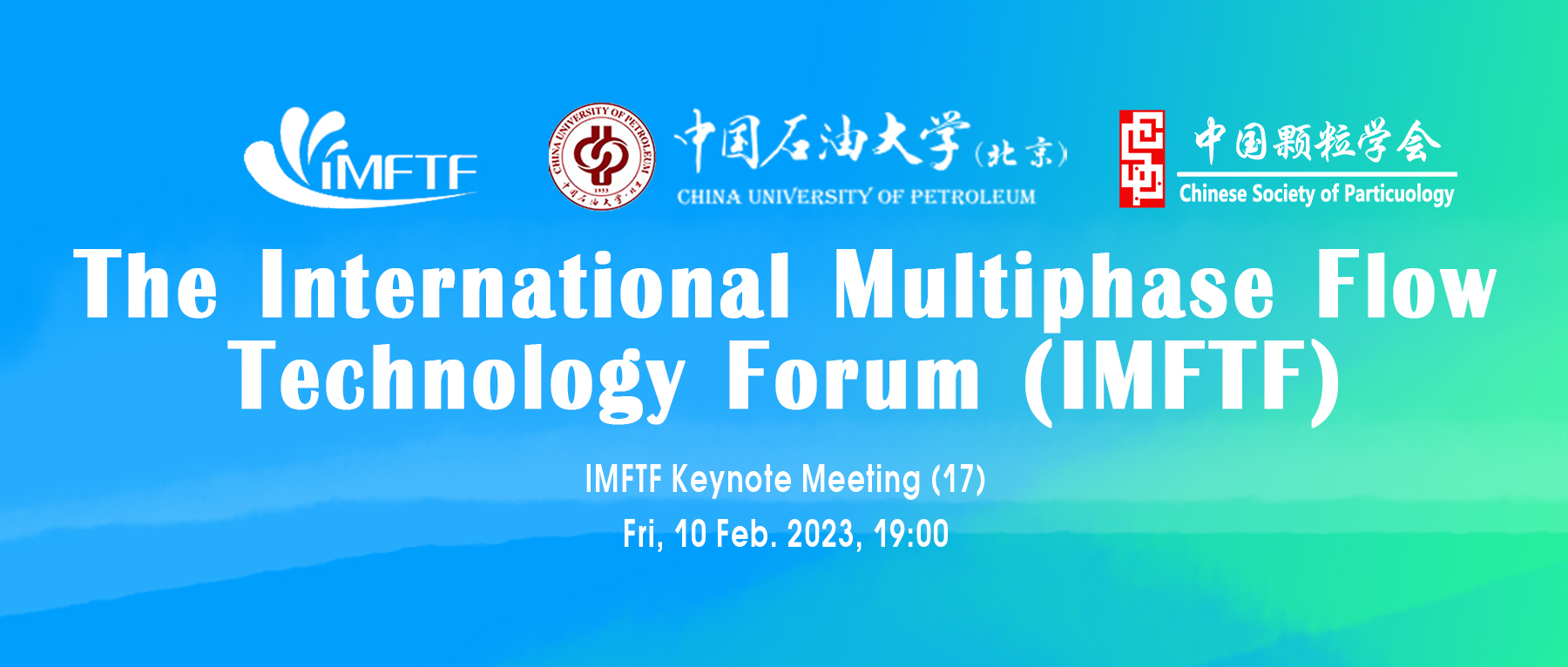
IMFTF Keynote Meeting (17) Schedule
Date & Time: Fri, 10 Feb. 2023, 19:00
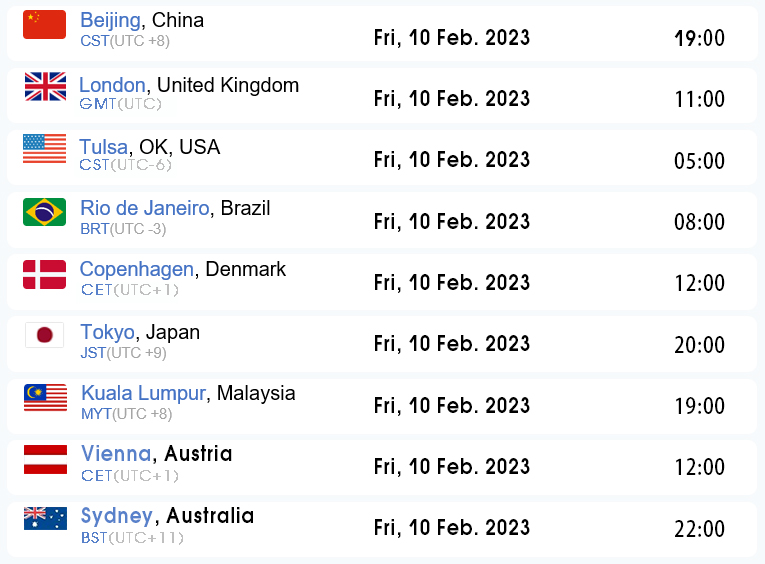
Chair:
Professor Jun Yao, China University of Petroleum, Beijing, China
Opening:
(19:00 – 19:05 Beijing Time)
Programme:
Keynote Speech-1
(19:05 – 19:45 Beijing Time)
Professor Hui Jin
Xi’an Jiaotong University, China
Q&A
(19:45 – 20:00 Beijing Time)
Keynote Speech-2
(20:00 – 20:40 Beijing Time)
Associate Professor Kit Windows-Yule
University of Birmingham, UK
Q&A
(20:40 – 20:55 Beijing Time)
Discussions, closing
(20:55 – 21:00 Beijing Time)
TBD
Platform: Zoom
https://us06web.zoom.us/j/82603518531?pwd=L0pGcHMvWnJIakM4YXNvSDBNQUxaUT09
Meeting ID: 826 0351 8531
Passcode: 0210
Organizers
International Multiphase Flow Technology Forum
China University of Petroleum-Beijing
Chinese Society of Particuology
View Live

Channel(视频号)

Bilibili(b站)

Weibo(微博)

Youtube
Keynote Speech-1
Multiphase reacting flow of supercritical water and coal particles
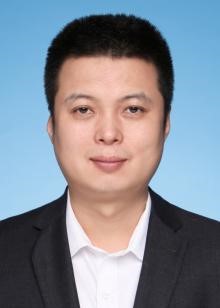
Hui Jin
Professor
Xi’an Jiaotong University, Xi’an, China
Supercritical water gasification technology of coal for hydrogen and power generation can be integrated to achieve multiple goals of clean, high efficiency, and low carbon. complete coal gasification in mild temperature is the key premise of technology industrialization. However, this process involves the strong coupling of multiphase physical and chemical processes, and it is difficult to achieve optimal matching of heat/mass transfer and chemical reaction. In this work, 1) reveal the law of heat and mass transfer between phases from the thermophysical perspective; 2) reveal the reaction reinforcement method and multi-scale zero-dimensional dynamic model from the thermochemistry perspective; 3) reveal the mechanism of collaborative optimization of heat/mass transfer and chemical reaction from the above two perspectives. The complete gasification of coal blow 670℃ was achieved. The breakthrough of the technical bottleneck and the reactor design theory was verified in the stable operation of the demonstration system.
References:
[1] Liejin Guo, Zhisong Ou, Ya Liu, Zhiwei Ge, Hui Jin, Mengmeng Song, Zihao Jiao, Wenhao Jing, Technological innovations on direct carbon mitigation by ordered energy conversion and full resource utilization, Carbon Neutrality, 2022, doi.org/10.1007/s43979-022-00009-5
[2] Liejin Guo, Hui Jin, Zhiwei Ge, Youjun Lu, Changqing Cao. Industrialization prospects for hydrogen production by coal gasification in supercritical water and novel thermodynamic cycle power generation system with no pollution emission. Sci China Technol Sci. 2015, 58, 1989-2002.
[3] Liejin Guo, Hui Jin. Boiling coal in water: Hydrogen production and power generation system with zero net CO2 emission based on coal and supercritical water gasification. International Journal of Hydrogen Energy. 2013, 38, 12953-67. WOS:000325307000031. Accession number: 0133816755010
[4] Liejin Guo, Hui Jin, Youjun Lu. Supercritical water gasification research and development in China. The Journal of Supercritical Fluids. 2015, 96, 144-50.
Speaker Information
Education:
• Ph.D.(Sep 2011) Thermal Energy Engineering in Mechanical Engineering, Xi'an Jiaotong University, China
• B.S. (Jul 2005) Thermal Energy Engineering in Mechanical Engineering, Harbin Institute of Technology, China
Awards:
• Chung-Hua Wu Outstanding Students Award, 2011
• The first prize of science and technology of Shaanxi Province, 2014
• Top 10 Advances in Science and Technology in Chinese University, 2017
• Chung-Hua Wu Outstanding Young Scholar Award, 2022
• Youth Particuology Award in Chinese Society of Particuology, 2022
Work Experience:
• Lecturer (2011-2015), State Key Laboratory of Multiphase Flow in Power Engineering, Xi’an Jiaotong University
• Associate professor (2015-2018), State Key Laboratory of Multiphase Flow in Power Engineering, Xi’an Jiaotong University
• Professor (2018-Now), State Key Laboratory of Multiphase Flow in Power Engineering, Xi’an Jiaotong University
• Director of Multiphase Flow in New Energy Institute in Xi’an Jiaotong University, 2018
• Leader of Shaanxi University Youth Innovation Team
• Assistant director of Integrated Cooperative Innovation Center for a New Type of High-Efficient Coal Gasification, 2012
• Council member of China Society of Electrical Engineering
• Deputy leader of multiphase flow professional group in the Chinese Society of Theoretical and Applied Mechanics
• Council member of Space Materials Science and Technology Branch of China Society of Chinese Materials Research Society
• Academic secretary of multiphase flow Professional Committee in Chinese Society of Engineering Thermophysics
• Member of Hydrogen Energy Professional Committee of China Renewable Energy Society
• Member and deputy secretary general in the Fossil and New Energy Inspection and Testing Branch in China National Association for Automation in Petroleum and Chemical Industry
• Youth Director of Chinese Society of Particuology
• Youth committee of Process Simulatiton and Emulation Specialized the Chemical Industry and Engineering Society of China
• Reviewer for Chilean National Commission for Scientific and Technological Research (CONICYT), the US-Israel Agricultural Research & Development Fund, 2018
• Associate editor in Energy Sources, Part A: Recovery, Utilization, and Environmental Effects
• Editorial board member of Carbon Resources Conversion, Carbon Capture Science & Technology
• Youth Editorial Board in Biochar, Carbon Research, DeCarbon
• Guest Editor in Physics of Fluids, ACS Sustainable Chemistry & Engineering, Industrial & Engineering Chemistry Research, International Journal of Hydrogen Energy, Renewable Energy, Sustainable Energy Technologies and Assessments, Journal of Renewable Materials, BMC Chemistry
Selected Publications:
• Hui Jin, Yingdong Wang, Huibo Wang, Zhenqun Wu, Xiaoyu Li, Influence of Stefan flow on the drag coefficient and heat transfer of a spherical particle in a supercritical water cross flow. Physics of Fluids, 2021, 33(2), 023313.
• Yingdong Wang, Huibo Wang, Hui Jin*, Liejin Guo, Numerical simulation of adiabatic /cooled/ heated spherical particles with Stefan flow in supercritical water, Physics of Fluid, 2021, 33, 053305
• Xiaoyu Li, Huibo Wang, Yi Li, Hui Jin*, Drag of a single particle within a multi-particle system in supercritical water, Physics of Fluids, 2022, 34, 113311.
• Kun Jiang, Bowei Zhang, Weizuo Wang, Hui Jin*, Effect of the variable physical properties on sub- and supercritical CO2 flowing over a stationary spherical particle, Physics of Fluids, 2022, 34, 103605.
• Bin Bai, Hui Jin*, Peng Liu, Weizuo Wang, Jie Zhang, Experimental study on the equilibrium position of a falling sphere in a circular tube flow, International Journal of Multiphase Flow, 2022, 153, 104112.
• Yingdong Wang, Mingyue Zhang, Huibo Wang, Hui Jin*, The influence of Stefan flow on the flow and heat-transfer characteristics of spherical-particle pair in supercritical water, International Journal of Multiphase Flow, 2022, 151, 104045.
• Xiao Zhao, Hui Jin*, Investigation of hydrogen diffusion in supercritical water: A molecular dynamics simulation study. International Journal of Heat and Mass Transfer, 2019, 133, 718-728.
• Chao Fan, Hui Jin*, A zero-dimensional model of porous char gasification in supercritical water: Experiments and mathematical modeling, Chemical Engineering Journal, 2022, 440, 135954.
• Zhenqun Wu, Yifei Ren, Guobiao Ou, Hui Jin*, Influence of special water properties variation on the heat transfer of supercritical water flow around a sphere, Chemical Engineering Science, 2020, 222, 31, 115698.
• Yi Li, Huibo Wang, Jinwen Shi, Changqing Cao, Hui Jin*, Numerical simulation on natural convection and temperature distribution of supercritical water in a side-wall heated cavity, Journal of Supercritical Fluids, 2022, 181, 105465
Email:
jinhui@mail.xjtu.edu.cn
Keynote Speech-2
Positron Emission Particle Tracking: A technique for the high-speed, high-resolution imaging of particulate, fluid, and multiphase flows in diverse academic and industrial systems
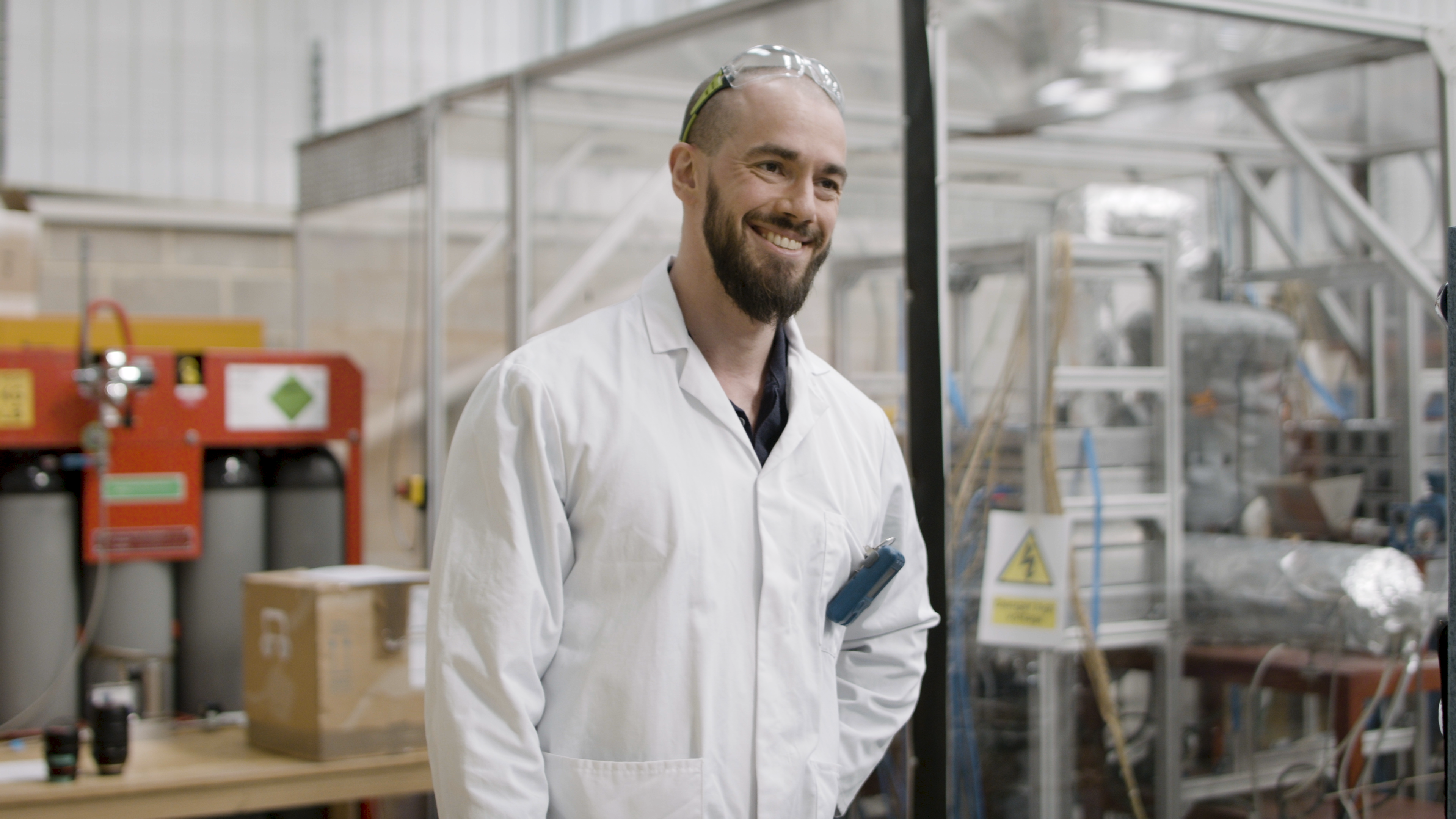
Kit Windows-Yule
Associate Professor
University of Birmingham, UK
Positron Emission Particle Tracking (PEPT) is a unique imaging technique, developed at the University of Birmingham, allowing the fully-three-dimensional imaging of particle and fluid motion, with high temporal and spatial resolution, even deep within the interiors of large, dense, optically opaque systems [1-3]. This unique capability has made PEPT a popular tool for the study of industrial process equipment, which is typically housed in steel or other metals, meaning that conventional optical imaging methods are typically unsuitable. The rich, detailed, three-dimensional data provided by PEPT have also been shown to be highly valuable in the calibration and validation of discrete element method (DEM), Computational Fluid Dynamics (CFD) [4-7], ), and multiphase particle-in-cell (MP-PIC) simulations (bit.ly/3i7pFZl) making it a highly valuable tool for those wishing to create highly-accurate numerical models of scientific and industrial systems.
Though widely used in Europe, America and Africa, the technique is yet to be significantly adopted by researchers in China, where its capabilities stand to prove valuable both to the Nation’s academic and industrial institutions.
In this talk, Dr. Kit Windows-Yule, a world expert in PEPT imaging [1-3], will provide an introduction to the technique and its underlying physics and algorithms, as well as describing case studies in which PEPT has been applied to diverse problems of real-world interest, including waste plastic recycling, pharmaceutical secondary manufacture, and even the diagnosis of cardiovascular disease.
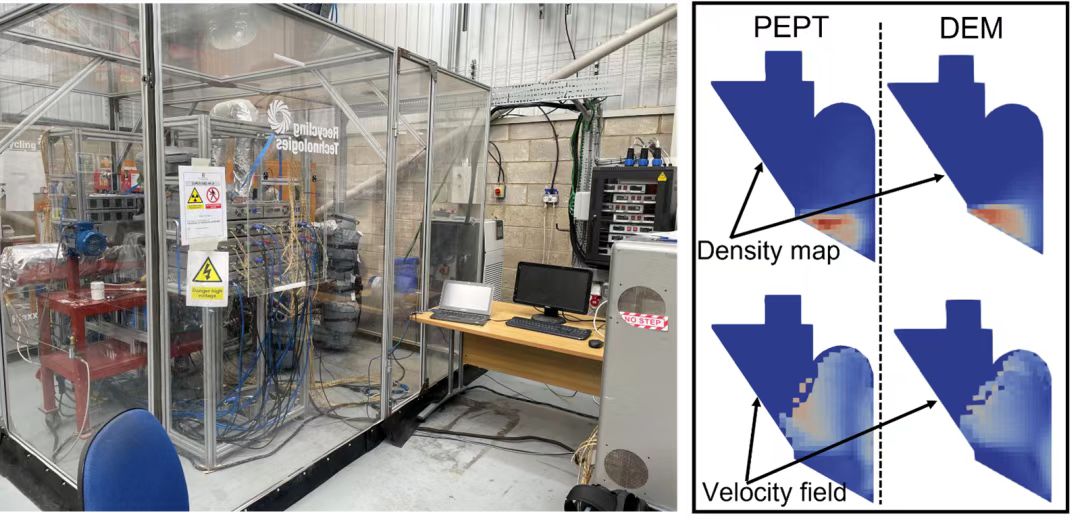

Figure 1: Left: A modular PEPT camera being used in situ at the HQ of industrial partners Recycling Technologies to image the internal dynamics of a fluidized-bed-based plastic recycling system. Right: Comparison of “real”, experimental PEPT data and data obtained from a coupled CFD-DEM simulation of a spouted bed coffee roaster provided by industrial partners Jacobs Douwe Egberts, illustrating how the data-rich nature of PEPT allows for the detailed validation of complex simulation models.
References:
[1] K. Windows-Yule, L. Nicuşan, M.T. Herald, S. Manger, D. Parker, Positron Emission Particle Tracking, (2022).
[2] C.R. Windows-Yule, M. Herald, L. Nicusan, C. Wiggins, G. Pratx, S. Manger, E. Odo, T. Leadbeater, J. Pellico, R. de Rosales et al., Recent Advances in Positron Emission Particle Tracking: A Comparative Review, Reports on Progress in Physics (2021).
[3] C. Windows-Yule, J. Seville, A. Ingram, D. Parker, Positron Emission Particle Tracking of Granular Flows, Annual Review of Chemical and Biomolecular Engineering 11 (2020).
[4] H. Che, M. Al-Shemmeri, P.J. Fryer, E. Lopez-Quiroga, T.K. Wheldon, K. Windows-Yule, PEPT validated CFD-DEM model of aspherical particle motion in a spouted bed, Chemical Engineering Journal 453 (2023) 139689.
[5] C. Windows-Yule, T. Weinhart, D. Parker, A. Thornton, Effects of packing density on the segregative behaviors of granular systems, Physical review letters 112 (2014) 098001.
[6] C. Windows-Yule, N. Rivas, D. Parker, Thermal convection and temperature inhomogeneity in a vibrofluidized granular bed: The influence of sidewall dissipation, Physical review letters 111 (2013) 038001.
[7] C. Windows-Yule, A. Rosato, A. Thornton, D. Parker, Resonance effects on the dynamics of dense granular beds: achieving optimal energy transfer in vibrated granular systems, New journal of physics 17 (2015) 023015.
Speaker Information
Education:
• PhD Nuclear Physics, the University of Birmingham (2015)
• MSci Physics and Astronomy, the University of Birmingham (2011)
Awards:
Turing Fellow
Royal Academy of Engineering Industrial Fellow
In his 4 year career at the University of Birmingham, Dr. Windows-Yule has won research funding from institutions including the Engineering and Physical Sciences Research Council, the Royal Society, the Royal Academy of Engineering, the British Academy, and InnovateUK totaling £1.97 M (¥17M ), in addition to more than £800k (¥6.9M) industrial funding from companies including AstraZeneca, FMC, GlaxoSmithKline, Johnson Matthey, Mondelez, Rolls Royce and Unilever.
Work Experience:
• Postdoctoral Researcher, Department of Thermal and Fluid Engineering, Universiteit Twente, the Netherlands (2015-2017)
• Postdoctoral Researcher, Engineering of Advanced Materials Excellence Cluster, Friedrich-Alexander Universität Erlangen-Nürnberg, Germany (2017-2018)
• Assistant Professor, School of Chemical Engineering, the University of Birmingham (2018-2022)
• Associate Professor, School of Chemical Engineering, the University of Birmingham (2022-Present)
Selected Publications:
Windows-Yule, K., Seville, J. P. K., Ingram, A., & Parker, D. J. (2020). Positron emission particle tracking of granular flows. Annu. Rev. Chem. Biomol. Eng, 11, 367-396.
A review paper detailing the underlying methodologies and academic and industrial applications of the PEPT technique, published in the prestigious Annual Review of Chemical and Biomolecular Engineering journal (impact factor 9.7)
Windows-Yule, K., Herald, M., Nicusan, L., Wiggins, C., Pratx, G., Manger, S., et al. (2021). Recent advances in positron emission particle tracking: a comparative review. Reports on Progress in Physics.
An international collaboration, led by the proposed speaker, aiming to create a standardized set of benchmarking tests for the PEPT technique. The paper involved participants from 10 international institutions, including Stanford University, King’s College London, and the University of Edinburgh, and was published in the highly prestigious Reports on Progress in Physics journal (impact factor 17.3)
Windows-Yule, K., Nicuşan, L., Herald, M. T., Manger, S., & Parker, D. (2022). Positron Emission Particle Tracking. Institute of Physics publishing
The first and only book on the PEPT technique.
Che, H., Al-Shemmeri, M., Fryer, P. J., Lopez-Quiroga, E., Wheldon, T. K., & Windows-Yule, K. (2022). PEPT validated CFD-DEM model of aspherical particle motion in a spouted bed. Chemical Engineering Journal, 453, 139689.
A recent paper, published in the Chemical Engineering Journal (impact factor 16.7), demonstrating how PEPT can be used for the rigorous validation of complex CFD-DEM simulations of industrial systems.
Email:
c.r.windows-yule@bham.ac.uk
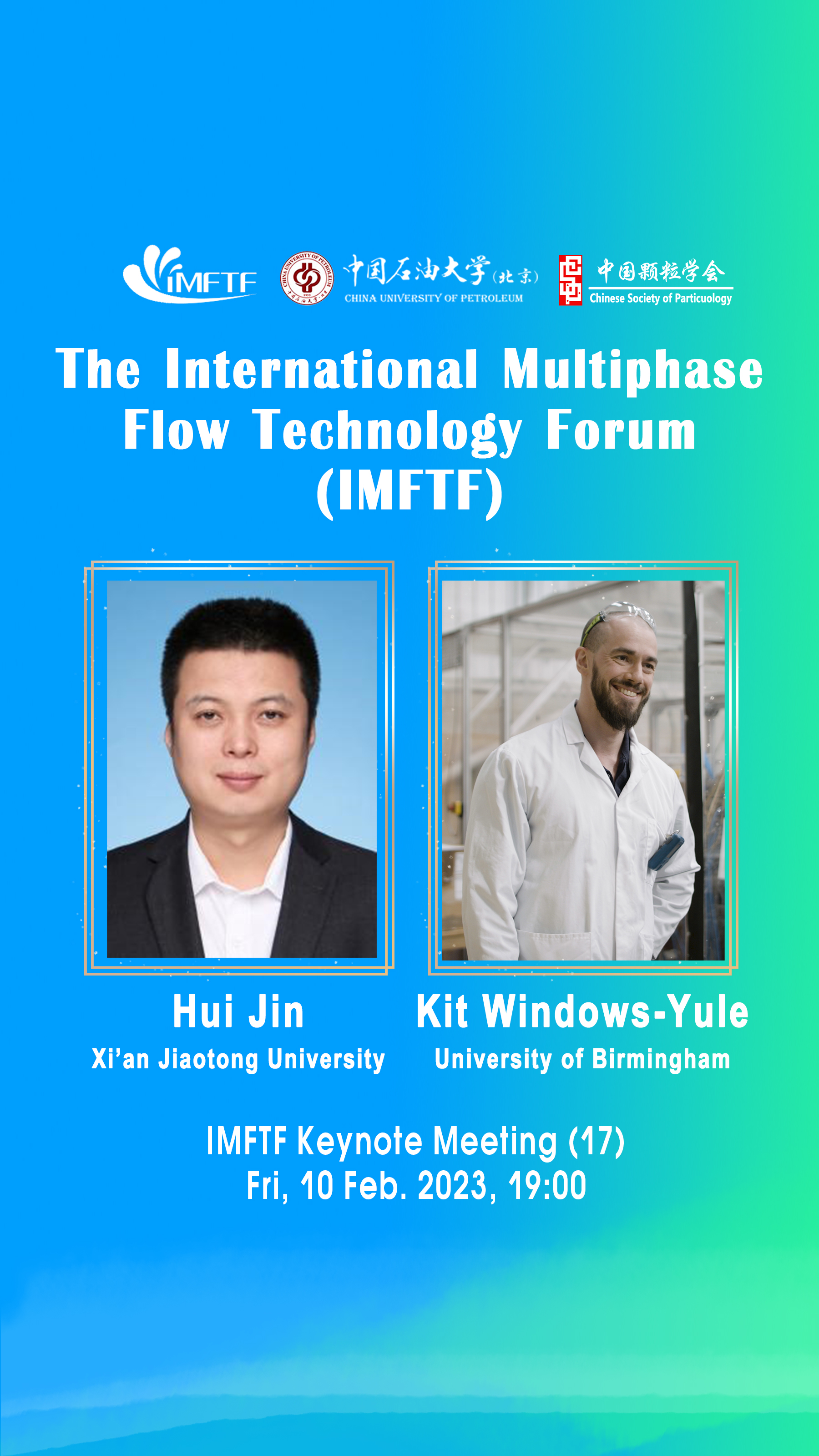


Gift for Participation 提问有奖
直播期间留言互动、在线提问者即有机会获得商务双肩包、精美茶具等神秘礼品~
领奖方式:主持人选中的问题即为获奖。获奖者请发送正确的联系方式“平台昵称+姓名+手机号+邮寄地址”至微信公众号后台或中国颗粒学会邮箱klxh_meeting@ipe.ac.cn(备注:IMFTF),学会将于7个工作日内与获奖者联系并寄出奖品。
注:奖品随机且单场论坛内不重复获奖(即每个ID/地址每次会议限领一次奖品)
Gift for Participation
During the live, participants who actively make interaction and ask questions will have the chance to win business backpack, exquisite tea set or other mysterious prizes ~
How to get your prize: You can get a prize if your quetion is selected by the host. Please send your contact information by "platform nickname + real name + mobile phone number + mailing address" to our WeChat official account or to klxh@ipe.ac.cn (with the remark: IMFTF). We will contact you and send the prize within 7 working days.
Note: Prizes will be random and you won't get more than one prize during a single forum (i.e. each ID / address is limited to one prize per forum).



 京公网安备11010802033820 号
京公网安备11010802033820 号